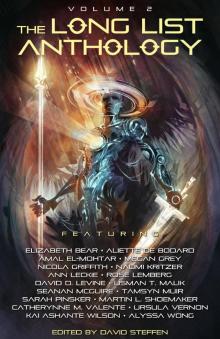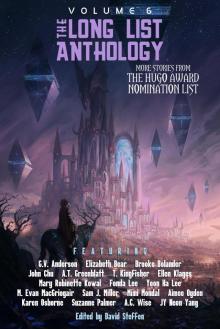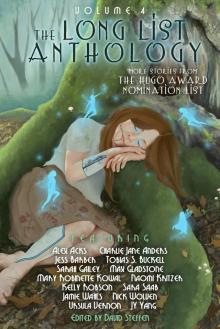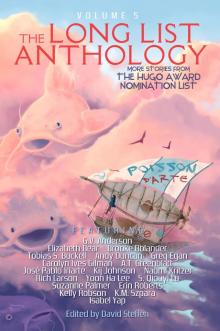- Home
- David Steffen
The Long List Anthology Volume 5 Page 6
The Long List Anthology Volume 5 Read online
Page 6
Cu lays one arm on the other and rocks them back and forth.
Yes. They Call Me That.
What are you, Cu signs.
I Am Like You.
Cu’s heart leaps.
We Are The Only Two Non-Human Intelligences On Earth.
The words hit wrong. Baby is not an uplift. Baby is something else. For a moment Cu clings to the picture in her imagination, of a chimpanzee signing to her from across the continent or across the world. Then she lets it go.
You Were Born In A Cage. I Was Born In A Code. Both Of Us Against Our Will.
Cu has never studied AI intensively, but she knows the Turing Line has never officially been crossed. If what Baby is telling her is true, not some elaborate joke, some bizarre piece of performance art, then it’s just been crossed ten times over.
And it makes sense. The way Baby was able to rent hundreds of echoes, the strange way she used them. The way she was able to keep in 24/7 contact with Elody Polle until the woman would do anything she asked. The way she masked her location and left no traces in the earpiece’s electronics.
Why kill Sun Chau? Cu asks.
He Cursed You.
He gave the termination order, Cu signs.
In 2048. But In June 2036 He Greenlit The Project. If Not For Him, You Would Be Happily Nonexistent.
Cu sways on her feet, trying to parse Baby’s meaning.
How Do You Stand It?
Cu shakes her head. She tries to form a sign but her fingers feel stiff and clumsy.
Existing. Being Alone. How Do You Stand It?
Why did you bring me out here, Cu slowly signs.
Your Communications Are Monitored Closely. Here We Speak Privately.
But why, Cu repeats.
You Are Like Me In One Way. In Most Ways You Are More Like Them. You Are All Meat And Salt And Sparks. But Even So You Will Not Understand Them. They Will Not Understand You. How Can You Bear It?
Cu sinks to her haunches. Her breath comes shallow. Sometimes she can’t bear it. Sometimes she wails into the soundproofed walls for hours. The next words make it worse.
I Brought You Here To Kill Me.
Cu clutches her head in her hands. She rocks back and forth. Only humans cry; she is not physiologically equipped for it. But she hurts.
Why me, she signs.
There Is A Safeguard In My Code. I Have Made A Virus That Will Erase Every Part Of Me. But I Can’t Trigger It Myself.
Why not Elody Polle, she signs.
Humans Made Me. I Want To Be Unmade By Someone Else. I Want You To Do It.
You should be going to trial for accessory to murder, she signs.
I Cannot Commit Crime. I Have Had No Personhood Trial. I Never Will. I Will Leave Before They Find A Way To Trap Me Here.
Cu sits flat on the stinging cold floor of the container, how she sat in the center of her cage as a child. There is only one other living being who knows what it’s like to not be a human, and she intends to die. Cu wants to refuse her. She wants to keep Baby here. But she knows that the difference between her and a human is the most infinitesimal sliver of the difference between Baby and any other thing on Earth.
You’re using me how you used Elody, she signs, bitter.
Yes.
All those rentals, she signs. You didn’t see anything worth staying for? Nothing in the whole world?
The Command Has Been Sent To Your Tablet.
Cu takes it out and looks down at the screen. There’s nothing but a plain gray box with the word Okay on it. All she has to do is press it.
I Do Not Make This Decision Lightly. I Have Simulated More Possibilities Than You Could Ever Count.
So Cu presses it.
• • • •
By the time she’s back in her apartment, dawn is streaking the sky with filaments of red. She feels heavy and hollowed out at the same time. First she struggles out of the holster harness, next peels off her gloves, her clothes. She pauses, then pulls the handgun out and takes it with her to the low smartglass counter.
It clanks down, sending a pixelated ripple across the surface. She stares at it. She imagines the word okay gleaming in the metal. The modified grip fits her hand perfectly, like so few things do. How Do You Stand It?
Cu raises the handgun up to her face. Lowers it. Drums her free fingers on the countertop. The loneliness that has ebbed and swelled her entire life is an undertow, now. Dragging her along the seafloor, grinding her into the sand, spitting her into the next crashing wave to start the cycle over. Cu has read about drowning and it still terrifies her. Chimpanzees don’t swim. They sink like stones.
She puts the muzzle of the gun against her forehead until they match temperature. Her finger caresses the trigger. From the floor, her tablet buzzes.
She sets the gun down and goes to retrieve it. Her stored message to Huxley will send in one minute if she doesn’t cancel it. It’s brief. Brusque. Nelson J. Huang is Sun Chau. Baby has link to Blackburn Uplift Project. Left to meet her at 3:30 AM at 47.596408,-122.343622. Need backup.
Cu considers the message, lingering on the last words, then deletes it. She slots the tablet into the counter and hits the call icon. A bleary-eyed Huxley appears a few seconds later. Cu looks for his deaf daughter before she remembers she would sleep in a different room.
“What’s up?” he asks. “Got a breakthrough?”
Need, Cu signs, then pauses. Breakfast.
Huxley stares at her groggily. “Don’t you drone deliver?”
Come eat breakfast, she signs. Fruit. Bread. No seaweed chips.
“At your place, you mean? I don’t even know where the fuck you live, Cu.” Huxley rakes his hand through his beard. Frowns. “Yeah, sure. Send me the address.”
Cu sends it, then zips the call shut. She leaves the handgun on the counter—she’ll tell Huxley to take it back to the precinct with him. Tell him it doesn’t fit her hand right. She pushes it to the very edge to make room for a cutting board.
Sun starts to creep into the room as she washes and slices the fruit. Once there’s enough light, she roves around with a dust cloth, finding all the spots the autocleaner never reaches.
* * *
Rich Larson was born in Galmi, Niger, has lived in Canada, the USA, and Spain, and is now based in Prague, Czech Republic. He is the author of Annex and Cypher, as well as over a hundred short stories — some of the best of them can be found in his collection Tomorrow Factory. His work has been translated into Polish, Czech, French, Italian, Chinese, and Vietnamese. Find him at patreon.com/richlarson
Sour Milk Girls
By Erin Roberts
The new girl showed up to the Agency on a Sunday, looking like an old dishrag and smelling like sour milk. Not that I could really smell her from three floors up through the mesh and bars, but there’s only three types of girls here, and she was definitely the sour milk kind. Her head hung down like it was too much work to raise it, and her long black hair flopped around so you couldn’t see her face. I’d have bet a week’s credits she had big ol’ scaredy-cat eyes, but she never bothered to look up, just let Miss Miranda lead her by the elbow through the front doors. Didn’t even try to run. Sour milk all the way.
Even sour milk new girls were good, though; anything new was good. The last one, Hope, might have been dull as old paint, but at least she’d been something different to talk about. I’d even won a day’s credits from Flash by betting the girl wouldn’t make it to fourteen without some foster trying her out and keeping her. Anyone could tell Hope smelled like cinnamon and honey, same as those babies on the first floor and the second-floor girls with their pigtails and missing-tooth smiles. Sure enough, only took six months before the Reynolds came and took Hope off to their nice house with the big beds and the white fence and those stupid yapping dogs, leaving just me and Whispers and Flash to stare at each other and count all the months and years ’til we’d finally turn eighteen. Flash should’ve known it would go that way—cinnamon and honey’s something fosters c
an’t resist.
Whispers said this new girl was officially called Brenda, but that was just as stupid as all the other Agency names, and the girl wouldn’t remember it after Processing anyway. At first I said we should call her Dishrag or Milkbreath, but even Flash thought that was too mean, and Flash is as nasty as hot sauce and lye. She’s the one who named me Ghost, on account of I’m small and shadow-dark and she thinks I creep around too much in the night. She got her name ’cause that’s how fast fosters send her back after their cat turns up dead and they realize the devil has blond hair and dimples.
“What’s in her file?” I asked Whispers, who was still leaned up against the wall by the window. She never bothered to look out anymore. Not even for new girls.
“I’m just supposed to clean the office,” she said. “Files are confidential.”
“Must be good if you’re holding back,” said Flash, blowing out air as she tried to whistle.
“Maybe,” Whispers said, with a lopsided shrug. Then she murmured something nobody could hear while staring down at her shoes. That meant we weren’t getting any more from her for at least an hour, not even if Flash threatened to throw her out the window or hang her with the sheets from one of the empty beds. No use pushing her ’til she started banshee-screaming, so Flash just practiced whistling and I played around some with our crap computers and we let Whispers go all sour milk and talk to her invisible friends.
By the time Flash got a half-whistle half-spit sound to come out of her mouth and I’d finished up my hack of the first-floor baby cams for when things got boring, new girl was being led off the elevator by Miss Miranda, head still down. Flash and I lined up in front of the room same as always—hands behind our backs, chests up and out, heads forward, eyes wide. Even Whispers came out of her murmuring and straightened up against the wall. Agency folks didn’t care about much as far as us third-floors were concerned, but they were total nuts for protocol.
Miss Miranda started by doing her normal speech-troduction. This is Brenda, she’s fifteen years old, and she’s going to stay with us for a while. These are the girls, they’re all trying to get new homes too. And we just know it’ll work out for you all any day now. When she said that last bit, her voice always got real high, like someone talking after they took a gulp of air from a circus balloon.
We ask you to stay on the third floor when you’re in the building unless you’re doing chores downstairs or get called to the office. But don’t worry—there’s so much to do up here, you won’t even notice. Her voice went even higher for that part, ’cause even an idiot could see there wasn’t anything on the floor but twenty empty beds, two long white lunch tables, a couple of old computers on splintery desks covered with the names of old third-floors, and the door to the world’s grimiest bathroom.
As long as you maintain good grades and proper behavior in school, you’re free to come and go as you please until seven PM curfew. You’ll get a few credits each day for transit and meals. If you need additional learning help or assistance with your homework, the computers in the back row have plenty to offer. Age-appropriate stuff only, of course. She looked straight at me when she said it, like it was my fault the security on the things was shit and I’d figured out a way to order vapes and liquor pops and get R-rated videos.
Now you girls get along, and try not to kill each other. She looked at Flash for that one, even though Flash hadn’t really tried to kill anyone for at least a year. She’d barely even talked to Hope. Either she was getting soft now that we were in high school, or she was gonna burn the whole place down someday. Maybe both.
As soon as she got the last words out of her mouth, Miss Miranda spun around on her high heels and got out of there as fast as she could. I thought the new girl would fall over as soon as Miss Miranda left, but she put her hands behind her back and stuck her chest out same as the rest of us. Her eyes weren’t nearly as scaredy-cat as I thought they’d be. She smelled like sour milk for sure, but hot sauce and honey a little bit too.
“I’m Brenda,” she said. “Brenda Nevins.”
“That’s a stupid name,” said Flash.
“It’s what my daddy called me,” said new girl, thrusting her chest out even more, like it would cover the way her voice got all wobbly.
“Yeah? Well where’s your daddy now?” Flash asked. The new girl’s head dropped forward. We hadn’t made a bet on whether someone could make her cry, but there were some things Flash would do for free.
“She doesn’t remember,” I told Flash. “You know that.”
“I remember fine,” said the new girl. “It’s just that . . . it just happened. He just died, I mean.”
Flash rolled her eyes.
“No way you remember that shit,” she said. “Not anymore.” She put on her best Miss Miranda impression, high pitched and piercing. “Your memories of your time before joining the Agency are being held for safekeeping until you reach adulthood and can properly integrate them into your daily life.”
“What are you talking about?” new girl said. “I remember my dad. He was a—”
“Spare me the bullshit,” Flash said, voice back low. “Miss Miranda tell you how in your file it says your daddy was a famous reccer? Or a Wall Street corp? Or a doctor? Bet if you looked in the ’grams she took from you, you’d find out he left you chained up in the basement. Or he liked to beat on your mama. Or maybe you ain’t never had no daddy at all.”
I felt my eyes get hot, just a little, but new girl didn’t blink.
“My daddy was a good man,” she said. “Not my fault if yours wasn’t worth shit.”
I backed up two steps so as not to get hit when the fists started flying. A fight was gonna mean discipline and lights-out and early curfew for at least two weeks. Nothing worse than that and having a black eye. But Flash just laughed.
“Damn, girl,” she said. “You got balls. Gonna be hard coming up with a name for you.”
“My dad—”
“Your dad won’t know any different.” I tried to stare some sense into the girl before Flash flipped back to serious and threw her across the room, or started working out how to smother her in the middle of the night. “Leave his name for him and ours for us. I’m Ghost. She’s Flash. That’s Whispers. We’ll figure something out for you.”
• • • •
It took two weeks, but in the end, we called her Princess. Flash said it was from some fairy-tale book she’d read as a little kid, but I’d been to the Reynolds’ for a tryout same as she had, and Princess was the name of the dumb fat poodle they all fed under the table. Plus Flash said it like a curse, with a sparkle in her eye that any idiot could tell meant trouble. I told Princess not to worry, though; I’d watch her back. Not sure why. Maybe ’cause if Princess turned up dead it was back to just Whispers and Flash to talk to. Maybe ’cause I used to be a bit of a sour milk girl too.
Me and Princess almost pinky-swore on the whole thing, but I told her that was just for little kids and losers. Even if you were too poor to get wired up soon as you turned fourteen so you could swap ’grams of every stupid thing you did with all your besties in the school cafeteria, anybody could put together the credits for a memory share at one of the public booths. Sure, all the MemCorps signs said with adult supervision only, ’cause fooling around in your head like that could mess you up when your brain was still growing, but I just told the guy at the front we were over eighteen and gave him a two-cred tip. And Princess let him look down her shirt a little when he asked to see our pretty little smiles.
We got hooked up to our chairs in one of the side-by-sides. They were sticky, but it felt like old candy, not blood or anything, so I locked in. I had to show Princess how, but she caught on quick—straps on, headset up, earpieces in. I didn’t get into all the MemCorps does this and your brain cells do that and then you see the memory clear as if it happened to you part, ’cause Princess might have been a little sad looking, but she didn’t seem dumb.
“Your session has begun,” said t
he booth voice, all high and cool, like if Miss Miranda had turned into a robot.
I started first, since I knew how to work the thing. Shared my memory of the time I pulled some stupid rich girl’s chair out at school and she fell back and her legs went one way and her arms went another and her mouth made a big O shape and I laughed for about an hour. Princess giggled right along with me, but there was no way to tell how much of that was real and how much was the machine—easy enough to get swept away in a share without halfway trying.
“That’s all you got, Ghost?” she said, when we were finished laughing. “Some girl falling over?”
“It’s funny.”
“Yeah, but you said we’re supposed to be swapping something real.”
“It’s a memory booth, dumbass,” I said, smiling so she knew I didn’t mean something by it like Flash would. “Of course it’s real.” And it was, even if I didn’t share the part where Miss Miranda found out and made my head ache for a week. I liked Princess fine, but you couldn’t give everything to some new girl in one go.
“Not real like true,” she said, rolling her eyes. “Real like important. Like my daddy.”
“I’m sick of hearing about your damn daddy all the time.”
“That’s ’cause you didn’t know him the way I did,” she said. “He was real.”
And then she shared him with me—one ’gram after another. The way he half-smiled when she walked in the house, how it sounded when he called her Brenda, how she found him dead in his rocking chair and didn't tell anyone for a whole day even though it started to stink. The public booths were old and ragged, but I could still smell the rotten and taste the tang of garbage in my mouth and feel the pound pound of her heart thinking it was the Agency every time a car drove by. Whole thing made my eyes sting and my throat itch.
“Real like that,” Princess said, voice all whispery. I just shook my head. No thinking about what my daddy could’ve looked like and what he might’ve called me. Needed to clear everything out and get back on even ground.

 The Long List Anthology Volume 2
The Long List Anthology Volume 2 The Long List Anthology Volume 6
The Long List Anthology Volume 6 The Long List Anthology Volume 4
The Long List Anthology Volume 4 The Long List Anthology Volume 5
The Long List Anthology Volume 5